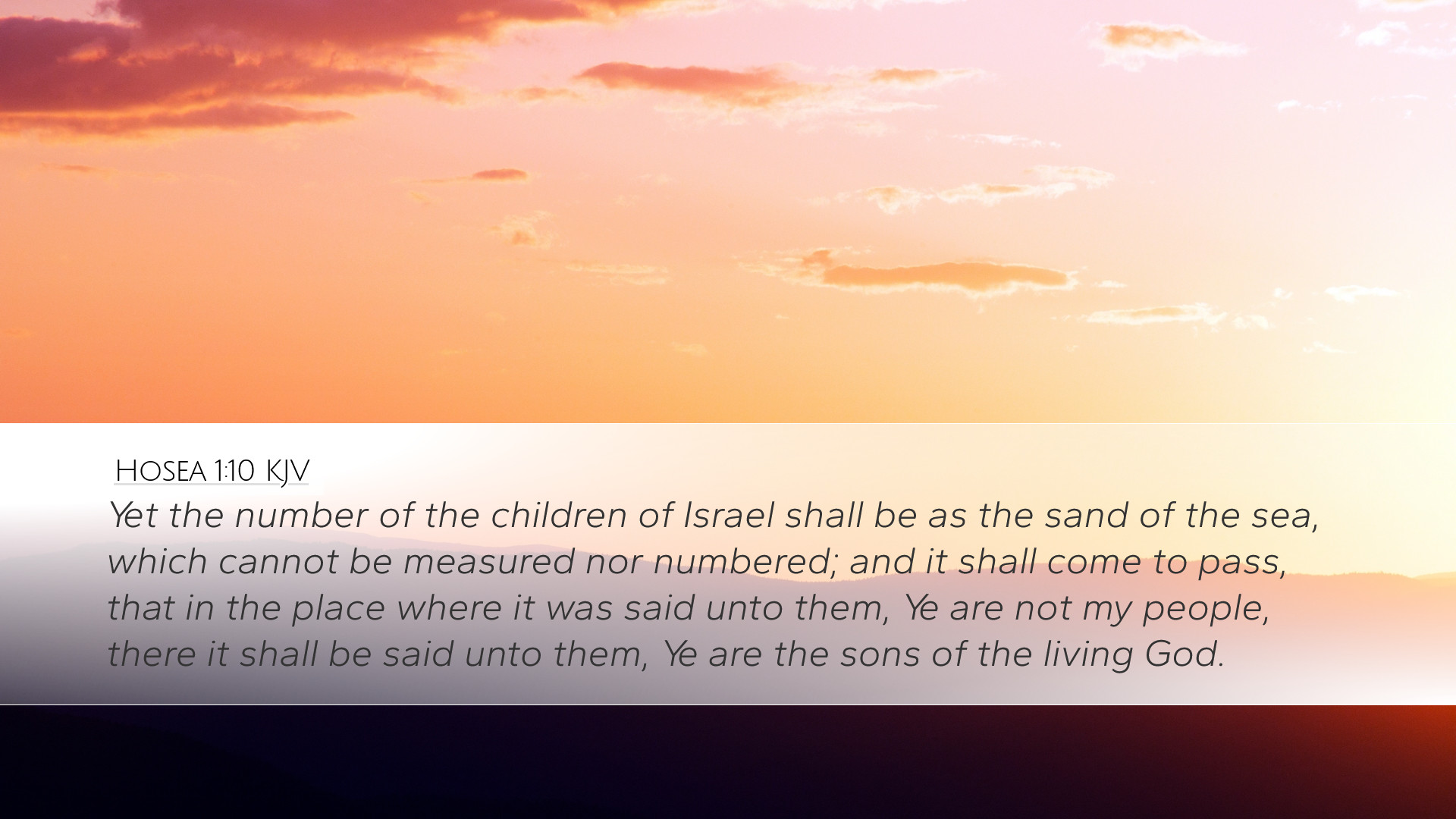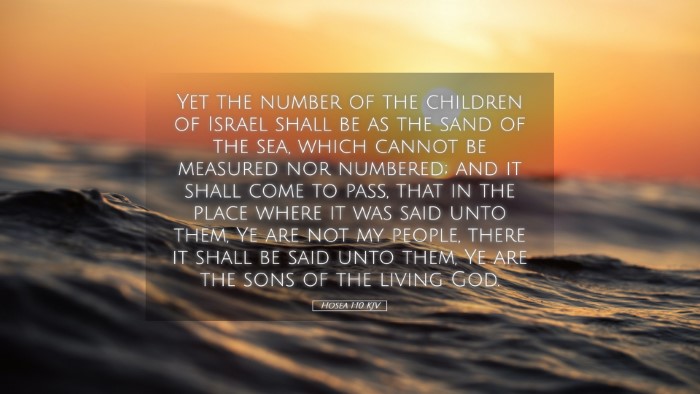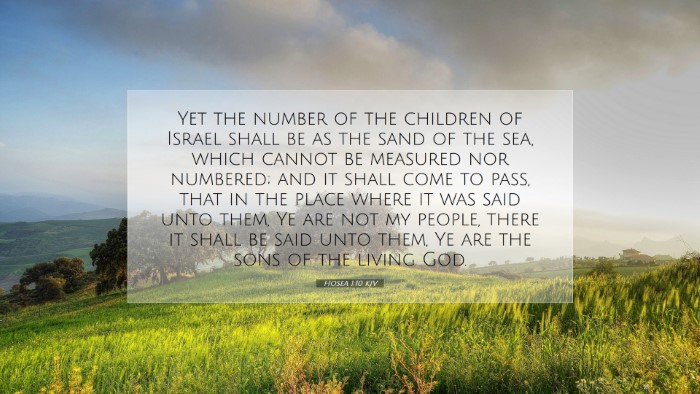Old Testament
Genesis Exodus Leviticus Numbers Deuteronomy Joshua Judges Ruth 1 Samuel 2 Samuel 1 Kings 2 Kings 1 Chronicles 2 Chronicles Ezra Nehemiah Esther Job Psalms Proverbs Ecclesiastes Song of Solomon Isaiah Jeremiah Lamentations Ezekiel Daniel Hosea Joel Amos Obadiah Jonah Micah Nahum Habakkuk Zephaniah Haggai Zechariah MalachiHosea 1:10
Hosea 1:10 KJV
Yet the number of the children of Israel shall be as the sand of the sea, which cannot be measured nor numbered; and it shall come to pass, that in the place where it was said unto them, Ye are not my people, there it shall be said unto them, Ye are the sons of the living God.
Hosea 1:10 Bible Commentary
Commentary on Hosea 1:10
Verse Reference: Hosea 1:10
“Yet the number of the children of Israel shall be as the sand of the sea, which cannot be measured nor numbered; and it shall come to pass, that in the place where it was said unto them, Ye are not my people, there it shall be said unto them, Ye are the sons of the living God.”
Introduction
This verse forms a pivotal part of Hosea’s prophetic message—a profound declaration of restoration and hope amidst judgment. Both the immediate context of Israel's disobedience and the overarching divine plan of salvation are captured in this verse. It reflects God's unyielding covenant love and speaks to the themes of judgment and eventual reconciliation. This commentary synthesizes insights from public domain scholars such as Matthew Henry, Albert Barnes, and Adam Clarke.
Exegesis of the Verse
Hosea 1:10 introduces a stark contrast with its earlier verses that detail the consequences of Israel's infidelity to God. While unfaithfulness led to separation and a loss of identity as God’s chosen people, the prophetic tone shifts to one of hope and affirmation of God's enduring promise.
The Numerical Metaphor
“Yet the number of the children of Israel shall be as the sand of the sea…”
This phrase alludes to the promise made to Abraham (Genesis 22:17) where God’s covenant included the multiplication of Abraham's descendants. Matthew Henry emphasizes that God’s mercy can lead to an abundance of grace even after profound disobedience. The term “sand of the sea” suggests a multitude that cannot be quantified, highlighting God’s capability to regenerate and continue His legacy through His people.
Restoration of Identity
“…in the place where it was said unto them, Ye are not my people, there it shall be said unto them, Ye are the sons of the living God.”
This line indicates a radical transformation in status for Israel. Adam Clarke notes that while their sinful state resulted in severance from God, His promise encompasses a renewal of their identity. The land of exile, which once defined their estrangement, will paradoxically become the setting for their reclamation. Albert Barnes highlights that in the context of God's mercy, the names given to Hosea’s children also serve to signify God's judgment as well as His redemptive purpose.
Theological Implications
The richness of Hosea 1:10 extends beyond its historical setting, stirring profound theological discourse.
Divine Sovereignty and Human Rebellion
This verse showcases God’s sovereignty in history. While Israel's sins necessitate punishment, God's covenantal love holds the power to redeem. Henry articulates the dual nature of God’s character—He is righteous in judgment yet abundantly merciful, demonstrating that grace prevails over judgment. This has implications for understanding the persistence of God's plans in the face of human rebellion.
Hope for Restoration
Hosea emphasizes hope amidst despair. Despite Israel’s unfaithfulness, restoration is not contingent upon their merit but rather on God’s covenant promise. Barnes posits that this serves as a comfort for believers today, indicating that even in dire circumstances, God can bring about renewal.
Application for Today’s Church
As theologians and pastors reflect on Hosea 1:10, several applications arise for contemporary audiences.
- The Assurance of God’s Love: This verse reassures believers that their status as “children of God” is rooted in divine grace rather than human effort. Believers are invited to embrace their identity as beloved children, irrespective of past failures.
- The Call to Repentance: The context of the promise calls for introspection regarding the church's fidelity to God. Just as Hosea addressed Israel's unfaithfulness, modern-day believers must also evaluate their priorities and realign their lives with God's purposes.
- The Hope of Restoration: Hosea’s promise teaches that hopeless situations can be transformed by God’s intervention. In times of crises, the church is called to proclaim that restoration is possible, mirroring the transformative message of the Gospel.
Conclusion
Hosea 1:10 encapsulates profound truths regarding identity, restoration, and divine love. The interplay of judgment and grace, highlighted by biblical commentators, underscores the holistic nature of God’s plan for humanity. As we delve into the depths of these insights, we are reminded that amid judgment, there is always the possibility for repentance, renewal, and relationship—a theme that resonates throughout the entirety of Scripture.


